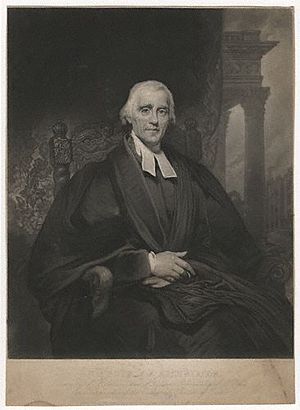Joseph Pott facts for kids
Joseph Holden Pott (born 1759, died 1847) was an important English church leader. He became the Archdeacon of London in 1813. An archdeacon is a senior priest who helps a bishop manage a part of the church's area.
Early Life and Education
Joseph Holden Pott was one of nine children. His father was Percivall Pott, a very famous surgeon. Joseph was born in his father's home, which was close to St. Bartholomew's Hospital in London.
He went to Eton College, a well-known school. After Eton, he studied at St John's College, Cambridge University. He earned his first degree (B.A.) in 1780 and a master's degree (M.A.) in 1783.
Church Career and Roles
After finishing his studies, Joseph became a priest. In 1785, he was given a special role at Lincoln Cathedral. This was his first important church position.
In 1787, he became the rector of two churches in London: St Olave, Old Jewry and St Martin, Ironmonger Lane. A rector is the main priest in charge of a church parish.
Just two years later, in 1789, he was made the archdeacon of St Albans. This was a big step up in his church career.
Over the years, Joseph Holden Pott moved to different church roles and locations:
- In 1797, he moved from his London churches to a living in Little Burstead, Essex.
- In 1806, he became the vicar of Northolt, Middlesex. A vicar is also a priest in charge of a parish.
- In 1812, he became the vicar of St Martin-in-the-Fields in London, a very famous church.
- In 1813, he changed his role from Archdeacon of St Albans to Archdeacon of London. This was a more senior position.
- In 1822, he became a canon at St Paul's Cathedral. A canon is a priest who is part of a cathedral's governing group.
- In 1824, he moved from St Martin's to become the vicar of Kensington.
- Finally, in 1826, he became a canon and chancellor at Exeter Cathedral.
Later Life and Legacy
Joseph Holden Pott retired from his archdeacon role and his vicarage in 1842. However, he continued to hold his canon positions at both St Paul's and Exeter Cathedrals until he passed away.
He died on February 16, 1847, at his home in London. He never married. When he died, he left behind many personal belongings and a large, valuable collection of books. His books were later sold at an auction.
His Writings
Joseph Holden Pott started writing poetry when he was at Eton College. Before 1786, he had already published four different works, including both poems and prose (regular writing).
He also helped a printer named John Nichols with a book called Literary Anecdotes. Another writer, Mathias, spoke highly of him in his work, saying Pott was "devout," meaning very religious.
Besides his main works, he also wrote many sermons (speeches given in church), controversial essays, and "archidiaconal charges." He gave twenty-six of these charges, which were official speeches or instructions to the clergy in his archdeaconry.
Here are some of his most important published works:
- Poems, published in 1779.
- Elegies, and Seimane, a Tragedy, published in 1782.
- Essay on Landscape-painting, with Remarks on the different Schools, published in 1783. This was about art.
- The Tour of Valentine, published in 1786.
- Testimonies of St. Paul concerning Justification, published in 1846.
 | Jackie Robinson |
 | Jack Johnson |
 | Althea Gibson |
 | Arthur Ashe |
 | Muhammad Ali |


